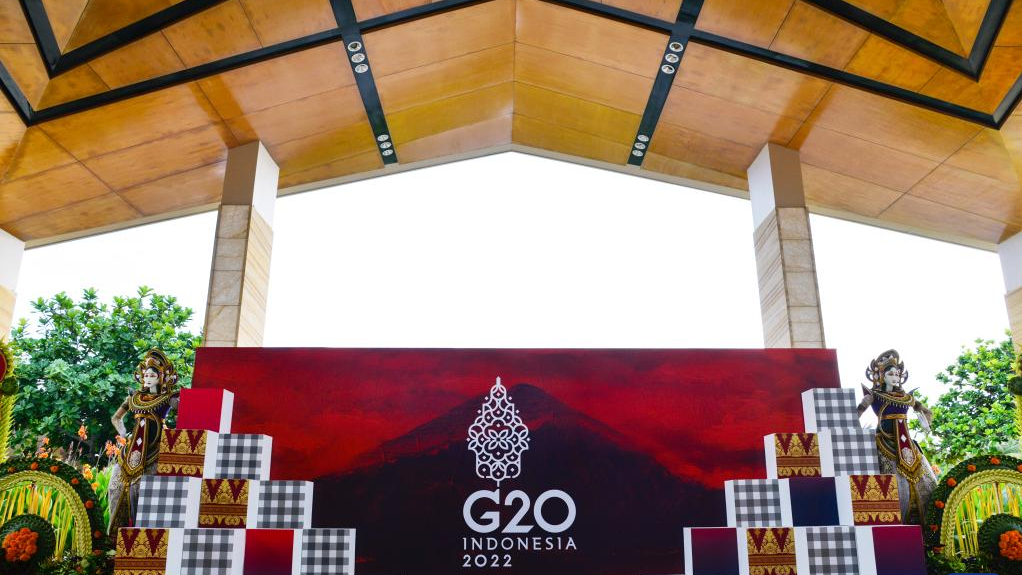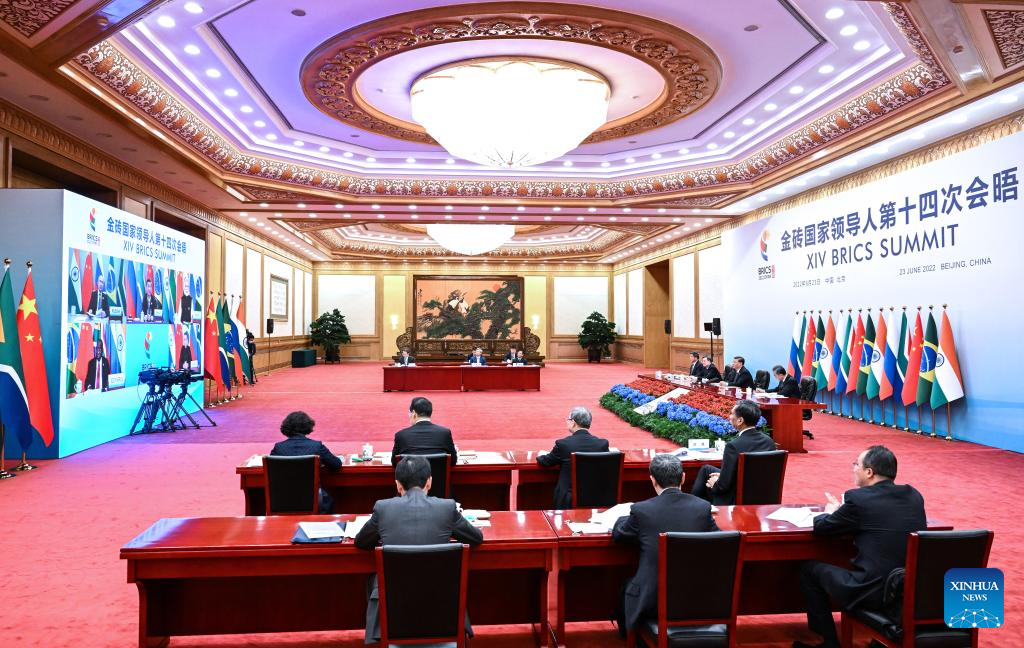
Logos and decorations for the 17th Group of 20 (G20) Summit outside a venue for the summit in Bali, Indonesia, November 11, 2022. /Xinhua
Logos and decorations for the 17th Group of 20 (G20) Summit outside a venue for the summit in Bali, Indonesia, November 11, 2022. /Xinhua
Editor's note: James Rae is a professor of politics and the director of the Asian Studies Program at California State University, Sacramento. The article reflects the author's opinion, and not necessarily the views of CGTN.
The theme of this year's G20 Summit is "Recover Together, Recover Stronger." The protracted COVID-19 pandemic has put the economic recovery of all countries to a severe test. We would like you to focus on the economic development vision put forward by the BRICS countries at the summit, focusing on how developing countries will use the G20 platform to promote economic recovery.
The BRICS countries, namely Brazil, Russia, India, China, and South Africa, represent the emerging economies of the world and the diversity of the future leadership of development priorities. As the BRICS countries continue to coalesce into a more regular and formal gathering, they increasingly shape the global discourse on socioeconomic issues.
The 14th BRICS Summit held in China this year represented just such a dialogue that produced a list of goals and commitments among the leaders of the five countries. At this year's 17th G20 Summit gathering in Bali, Indonesia, from November 15 to 16, the BRICS countries can speak as one voice in drawing attention to their common vision.

Chinese President Xi Jinping hosts the 14th BRICS Summit via video link in Beijing, capital of China, June 23, 2022. /Xinhua
Chinese President Xi Jinping hosts the 14th BRICS Summit via video link in Beijing, capital of China, June 23, 2022. /Xinhua
Meanwhile, the G7 countries (Canada, France, Germany, Italy, Japan, the United Kingdom, and the United States) remain a narrow slice of the world population and represent the inequities of the past global order which was dominated by colonialism and hegemonic power politics. The international organizations designed by the leading European and North American countries have struggled to accommodate the new global distribution of economic power, which is made more apparent particularly in the G20 gathering.
The Bretton Woods institutions of the World Bank and International Monetary Fund have faced challenges in reforming themselves to give greater voice to the developing world and emerging economies. Their model of conditionality and structural adjustment along neoliberal economic principles, as recommended by the Washington Consensus (specifically the preferences of the U.S. Treasury Department and the American private sector on Wall Street), have engendered widespread criticism from various ideological positions as well as subject countries that experienced significant hardship while adopting these policies of rapid liberalization of markets.
Thus, BRICS countries can offer a remedy, or at least an alternative model to the recommendations of the old guard international financial institutions. And the G20 Summit is really the place to do so in the new more multipolar economic order of the 21st century.
The BRICS countries thus offer reasonable and balanced suggestions for economic stability and growth. First, they support further internal cooperation among these five countries that span four continents, emphasizing greater economic, political, and people-to-people exchanges among themselves to develop mutual understanding.
The five partners are also seeking to speak with a singular voice that represents over three billion people by coordinating outlooks on major international and regional issues affecting the world. The next step is of course to translate those commitments into ideas and seek out concrete results, and the G20 is the perfect opportunity to present a solution-based position.
Thus, the BRICS countries can serve as a transmission belt to promote South-South cooperation and serve as a focal point among other emerging markets and developing countries to make sustainable and equitable development and common prosperity.
Specifically, BRICS countries at the G20 will promote multilateralism as a core norm of state behavior. In practice, championing an open and innovative world economy will boost the desired world economic recovery and long-term balanced development. These countries are so key to industrial and supply chains that their coordination on macroeconomic policy will become a driver of economic improvement as the world seeks to emerge.
The BRICS countries are also prepared to champion the goals of all countries, to build a green, low-carbon and circular economy. This can center the Paris Agreement of "common but differentiated responsibilities" principle to ensure the realities of climate change are embedded into the public policy choices of every country in ways that suit their development level. Reducing global warming is one of the key challenges of our time, and the BRICS countries will be key determinants of the success of those ambitions.
Just as climate change is a transnational problem that national borders cannot stop, the world has now recognized that infectious diseases cannot be stopped by national boundaries either. Greater cooperation on vaccine research and production and absolutely the equitable distribution of vaccines will spearhead improved public health cooperation for peoples who are at risk anywhere.
The 2022 G20 Summit will witness the ongoing balancing of the world order and the valuable inclusion of new more diverse and inclusive voices from around the globe. The BRICS countries will ultimately influence the outcome of all sorts of multilateral gatherings and promote common-sense solutions to shared global problems.
(If you want to contribute and have specific expertise, please contact us at opinions@cgtn.com. Follow @thouse_opinions on Twitter to discover the latest commentaries on CGTN Opinion Section.)